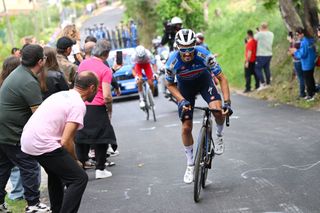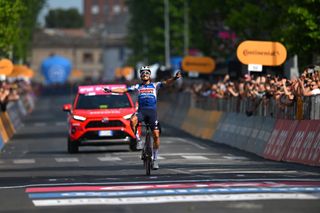Just a handful of months ago, Julian Alaphilippe had been written off by some. Since winning two consecutive road World Championships, the Frenchman had struggled to capture the form that saw him win in Imola in 2020, and Leuven a year later.
The 31-year-old seemed to be struck with the curse of the rainbow jersey, but that didn’t stop the critics from jumping on his misfortune, even those from within his own team.
Only in February, Alaphilippe stayed dignified and silent when Quick-Step boss Patrick Lefevere suggested in the Belgian press that his wife, former pro and Tour de France Femmes race director Marion Rousse, was partly behind his poor form.
Instead, he let his legs do the talking, and they answered his critics with an epic performance on Thursday at the Giro d’Italia as he became the 108th man to win stages in all three Grand Tours with victory on stage 12.
This was Alaphilippe back to his best and the kind of form that saw him regularly go toe-to-toe with Wout van Aert and Mathieu van der Poel in Classics seasons gone by. It was full of panache and aggression, as he relished the Classics-style course, littered with short, sharp climbs.
After finding himself in the day’s breakaway, alongside dozens of others, he disappeared up ahead with Mirco Maestri (Polti Kometa) once the hilly course began to bite. The duo were alone for more than 120 kilometres of racing. But, according to Alaphilippe, it was never in his initial thinking to make his move with such a long way to the line.
“I didn’t plan it,” he said post race. “I was expecting a big group to be in the breakaway. I think first I had to help my teammates, who really controlled perfectly the first 60 kilometres. Afterwards, I was really focused to be in the front.”
The latest race content, interviews, features, reviews and expert buying guides, direct to your inbox!

(Image credit: Getty Images)
Alaphilippe worked tirelessly with his Italian breakaway compatriot, before distancing him with one venomous attack on the brutally steep final climb.
“We went first in a big group, and then with Mirco Maestri together,” he added. “I said to him, ‘we go, we go, we go’ he really deserved to win today. He was amazing. We collaborated super well.”
In his Worlds winning pomp, Alaphilippe became known for his swashbuckling, energetic style, full of emotion and feeling. Before many of his victories, he’d tighten his shoes and shake out his legs before launching explosive attacks.
He was at it again on Thursday afternoon, tightening the BOA dials on his shoes before the gradients started to rise in the final kilometres of the day.
“I believed in it, but until the last kilometre, I had to keep pushing full gas because I heard [Jhonatan] Narváez was close behind me,” he explained. “It was my dream to win a stage in the Giro, and I did it. I’m really happy.”
His stage win couldn’t have come at a better time given that Alaphilippe is in his contract year at Quick-Step. Reports have suggested that he could leave the Belgian team at the end of the season, but victory in Fano could mean a new offer suddenly finds its way to him.

(Image credit: Getty Images)
At the start of the year, the 31-year-old told Cycling Weekly that he wasn’t even sure if he would ride on given his misfortune of late.
“It’s a victory that does me an enormous amount of good,” he said as he acknowledged the significance of becoming the 47th French stage winner at the Giro.
“It is an important victory for me,” he continued. “I’m thinking about my partner and my son, who have supported me a lot, recently and always. Also thank you to my whole team, who controlled the start of the stage today really well. I told them that it was a stage I had marked out, and I’m really glad to have managed it.”
Prior to stage 12, Alaphilippe’s palmarès contained six individual stages and the mountains classification at the Tour de France, as well as a stint in the yellow jersey, and various accolades from some of cycling’s biggest one day races, including Milan-San Remo.
It now contains a Giro d’Italia stage win. Proof that there’s life in the former rainbow jersey-wearer yet.

